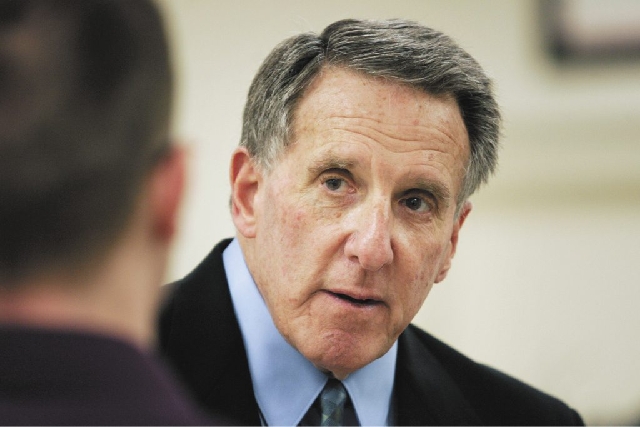Teachers Health Trust executive: ‘We’re not going out of business’

The chief executive officer of the Teachers Health Trust, a nonprofit that provides health insurance to Clark County public school teachers, said Tuesday that its coffers are not as depleted as suggested last month by the director of the union that founded it.
Peter Alpert acknowledged the trust has struggled in recent months, losing approximately $225,000 a month. He attributed the losses to teachers’ medical premiums remaining flat while medical costs and the price of prescription drugs have skyrocketed.
Predictions the trust would soon run dry were “far-fetched,” he said, noting a healthy source of funding the trust can tap into if needed.
“To state to those who think we’re going out of business, I’d say, ‘Talk to me first,’ ” he said. “We’re not going out of business.”
Concerns about the trust’s financial stability erupted in February after John Vellar-dita, executive director of the Clark County Education Association, which represents Clark County School District’s teachers, told members during a closed-door meeting that the trust could be “belly up in 60 to 90 days.”
The trust, which averages an annual revenue stream of $148 million, has lost more than $3.6 million since the fiscal year began July 1, Vellardita said last month. He could not be reached for comment Tuesday.
But Alpert said that the trust holds
$28 million in reserves through bonds and stocks and that funding can be turned into cash if the trust becomes desperate.
“For the first eight months of this fiscal year, we have averaged a deficit of $225,000 a month,” Alpert said. “You can all do the math: If that was going to continue, and I believe it will not, you multiply that and divide it into $28 million in reserves, you get an idea of how long we’re going to be around here. That is if all we did is use reserves, and that’s not going to happen.”
DISTRICT REFUSED REQUEST
During last year’s contract negotiations, the union refused to allow the district to assume responsibility for teacher health insurance though the district coordinates coverage for other employee groups. The district refused the trust’s request to deduct additional money from teachers’ paychecks for health insurance.
The School District and the teachers union soon will start bargaining again, talks that will resurrect the issue of whether an additional $8 should be taken from teachers’ paychecks to meet the increased costs of medical services. The increased premium would put the trust back on healthy financial ground, Alpert said.
“In September, we proposed a maximum of $8 a paycheck to the person that would have raised $500,000 per month for the health trust,” Alpert said, noting that premiums have not been raised since July 2008. “The School District refused to withhold the money from teachers’ paychecks and give it to us.”
If the matter goes to arbitration and the district wins, Alpert said other cost-cutting measures would be considered, but he declined to elaborate. Regardless of the arbitrator’s decision or potential cuts, the trust, as it is, can continue paying claims for some 18,000 teachers and their families for nearly three years, Alpert emphasized.
District spokeswoman Amanda Fulkerson said what Alpert suggests is simply a Band-Aid fix.
“We’re watching this issue very closely,” Fulkerson said. “If needed, we are prepared to step in and ensure all our employees have health care that is comparable or better with no lapse in coverage. We want our employees to know they will not be without coverage.”
Alpert said Tuesday that 93 percent of union members had voted in favor of the trust and its coverage. He later acknowledged that the vote was taken a decade ago. Once the arbitrator decides on the deduction issue, another vote could be taken, he said.
HEFTY WITHDRAWALS
The cost of claims filed by teachers and their dependents exceeds the trust’s revenue flow, according to a document Vellardita handed out last month. During the past two school years, the trust has made hefty withdrawals from what once was a $7.23 million cash reserve, he said at the meeting. The savings would have been completely depleted if it were not for a $5 million line of credit taken from the Bank of Nevada in November 2011.
In June, less than $1 million of that credit remained, according to audits obtained from the district.
The union director has said the reserves are at “critical levels.”
While Vellardita was out of the office Tuesday, Assistant Executive Director Letty Elias said the union has one essential goal.
“Our primary concern is to ensure teachers receive affordable and quality health care,” she said.
Alpert said the trust is lean: 95 percent of teachers’ fees go toward paying claims, leaving 5 percent for operational costs and overhead. For-profit insurance companies spend 15 percent on operational costs. If the teachers opted out of the trust, they would end up paying more for the same coverage or less for poor coverage, he said.
Alpert’s pay, which is about $500,000 a year, has been questioned. Health insurance consultant Terry Van Noy said that outsiders must consider that Alpert serves not only as the chief executive officer of the trust, but he is also a certified public accountant and an attorney. If the trust were to contract out all those services, it would be far more costly, he said.
The trust recently hired campaign strategist and consultant Tom Letizia to help explain the its financial situation.
“There were a lot of negative stories. The biggest blow was everyone has picked up that one comment,” Letizia said, referring to Vellardita’s statement that the trust would be “belly up in 60 to 90 days.”
“It created a lot of fear of about what is going on.”